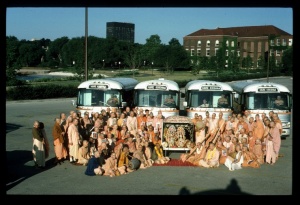CC Madhya 7.29

A.C. Bhaktivedanta Swami Prabhupada
TEXT 29
- iṅhā-sabāra vaśa prabhu haye ye ye guṇe
- doṣāropa-cchale kare guṇa āsvādane
SYNONYMS
iṅhā-sabāra — of all the devotees; vaśa — controlled; prabhu — the Lord; haye — is; ye ye — whatever; guṇe — by the qualities; doṣa-āropa-chale — on the plea of attributing faults; kare — does; guṇa — high qualities; āsvādane — tasting.
TRANSLATION
Actually the Lord was controlled by the good qualities of all His devotees. On the pretense of attributing faults, He tasted all these qualities.
PURPORT
All the accusations made by Śrī Caitanya Mahāprabhu against His beloved devotees actually showed His great appreciation of their intense love for Him. Yet He mentioned these faults one after another as if He were offended by their intense affection. The personal associates of Śrī Caitanya Mahāprabhu sometimes behaved contrary to regulative principles out of intense love for the Lord, and because of their love Śrī Caitanya Mahāprabhu Himself sometimes violated the regulative principles of a sannyāsī. In the eyes of the public, such violations are not good, but Śrī Caitanya Mahāprabhu was so controlled by His devotees’ love that He was obliged to break some of the rules. Although accusing them, Śrī Caitanya Mahāprabhu was indirectly indicating that He was very satisfied with their behavior in pure love of Godhead. Therefore in verse 27 He mentions that His devotees and associates place more importance on love of Kṛṣṇa than on social etiquette. There are many instances of devotional service rendered by previous ācāryas who did not care about social behavior when intensely absorbed in love for Kṛṣṇa. Unfortunately, as long as we are within this material world, we must observe social customs to avoid criticism by the general populace. This is Śrī Caitanya Mahāprabhu’s desire.